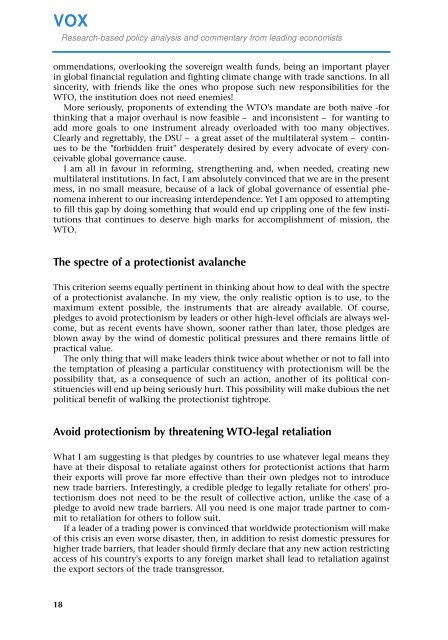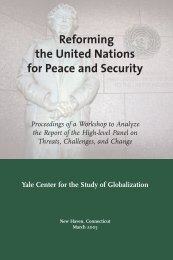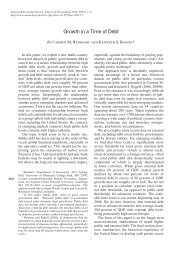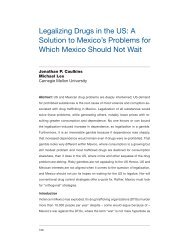The collapse of global trade, murky protectionism, and the crisis:
The collapse of global trade, murky protectionism, and the crisis:
The collapse of global trade, murky protectionism, and the crisis:
Create successful ePaper yourself
Turn your PDF publications into a flip-book with our unique Google optimized e-Paper software.
VOX<br />
Research-based policy analysis <strong>and</strong> commentary from leading economists<br />
ommendations, overlooking <strong>the</strong> sovereign wealth funds, being an important player<br />
in <strong>global</strong> financial regulation <strong>and</strong> fighting climate change with <strong>trade</strong> sanctions. In all<br />
sincerity, with friends like <strong>the</strong> ones who propose such new responsibilities for <strong>the</strong><br />
WTO, <strong>the</strong> institution does not need enemies!<br />
More seriously, proponents <strong>of</strong> extending <strong>the</strong> WTO's m<strong>and</strong>ate are both naïve -for<br />
thinking that a major overhaul is now feasible – <strong>and</strong> inconsistent – for wanting to<br />
add more goals to one instrument already overloaded with too many objectives.<br />
Clearly <strong>and</strong> regrettably, <strong>the</strong> DSU – a great asset <strong>of</strong> <strong>the</strong> multilateral system – continues<br />
to be <strong>the</strong> "forbidden fruit" desperately desired by every advocate <strong>of</strong> every conceivable<br />
<strong>global</strong> governance cause.<br />
I am all in favour in reforming, streng<strong>the</strong>ning <strong>and</strong>, when needed, creating new<br />
multilateral institutions. In fact, I am absolutely convinced that we are in <strong>the</strong> present<br />
mess, in no small measure, because <strong>of</strong> a lack <strong>of</strong> <strong>global</strong> governance <strong>of</strong> essential phenomena<br />
inherent to our increasing interdependence. Yet I am opposed to attempting<br />
to fill this gap by doing something that would end up crippling one <strong>of</strong> <strong>the</strong> few institutions<br />
that continues to deserve high marks for accomplishment <strong>of</strong> mission, <strong>the</strong><br />
WTO.<br />
<strong>The</strong> spectre <strong>of</strong> a protectionist avalanche<br />
This criterion seems equally pertinent in thinking about how to deal with <strong>the</strong> spectre<br />
<strong>of</strong> a protectionist avalanche. In my view, <strong>the</strong> only realistic option is to use, to <strong>the</strong><br />
maximum extent possible, <strong>the</strong> instruments that are already available. Of course,<br />
pledges to avoid <strong>protectionism</strong> by leaders or o<strong>the</strong>r high-level <strong>of</strong>ficials are always welcome,<br />
but as recent events have shown, sooner ra<strong>the</strong>r than later, those pledges are<br />
blown away by <strong>the</strong> wind <strong>of</strong> domestic political pressures <strong>and</strong> <strong>the</strong>re remains little <strong>of</strong><br />
practical value.<br />
<strong>The</strong> only thing that will make leaders think twice about whe<strong>the</strong>r or not to fall into<br />
<strong>the</strong> temptation <strong>of</strong> pleasing a particular constituency with <strong>protectionism</strong> will be <strong>the</strong><br />
possibility that, as a consequence <strong>of</strong> such an action, ano<strong>the</strong>r <strong>of</strong> its political constituencies<br />
will end up being seriously hurt. This possibility will make dubious <strong>the</strong> net<br />
political benefit <strong>of</strong> walking <strong>the</strong> protectionist tightrope.<br />
Avoid <strong>protectionism</strong> by threatening WTO-legal retaliation<br />
What I am suggesting is that pledges by countries to use whatever legal means <strong>the</strong>y<br />
have at <strong>the</strong>ir disposal to retaliate against o<strong>the</strong>rs for protectionist actions that harm<br />
<strong>the</strong>ir exports will prove far more effective than <strong>the</strong>ir own pledges not to introduce<br />
new <strong>trade</strong> barriers. Interestingly, a credible pledge to legally retaliate for o<strong>the</strong>rs' <strong>protectionism</strong><br />
does not need to be <strong>the</strong> result <strong>of</strong> collective action, unlike <strong>the</strong> case <strong>of</strong> a<br />
pledge to avoid new <strong>trade</strong> barriers. All you need is one major <strong>trade</strong> partner to commit<br />
to retaliation for o<strong>the</strong>rs to follow suit.<br />
If a leader <strong>of</strong> a trading power is convinced that worldwide <strong>protectionism</strong> will make<br />
<strong>of</strong> this <strong>crisis</strong> an even worse disaster, <strong>the</strong>n, in addition to resist domestic pressures for<br />
higher <strong>trade</strong> barriers, that leader should firmly declare that any new action restricting<br />
access <strong>of</strong> his country's exports to any foreign market shall lead to retaliation against<br />
<strong>the</strong> export sectors <strong>of</strong> <strong>the</strong> <strong>trade</strong> transgressor.<br />
18





